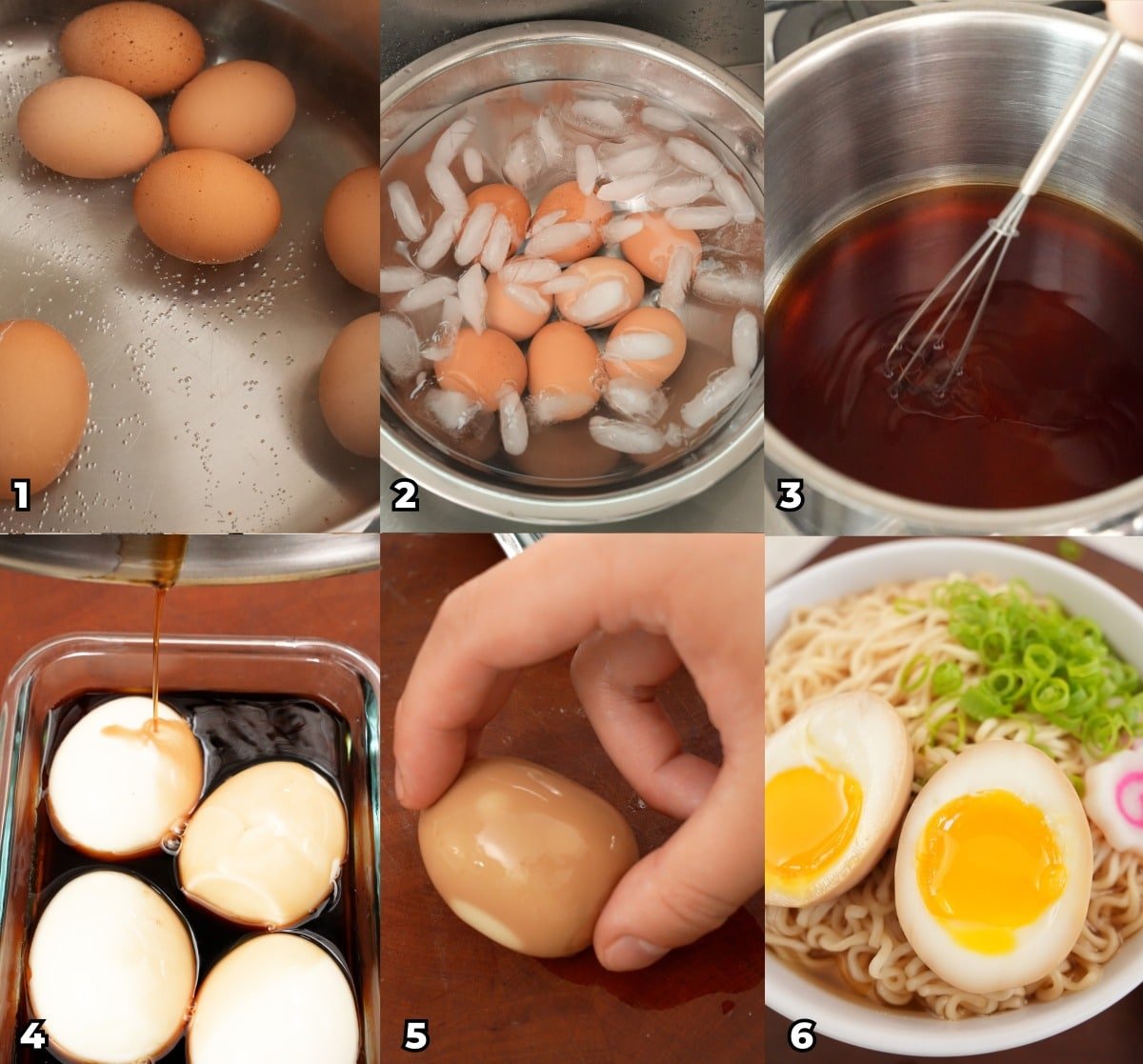EASY Ramen Eggs (Ajitsuke Tamago) (VIDEO)
This post may contain affiliate links. Please read our disclosure policy.
Ramen Eggs (Ajitsuke Tamago) are soft boiled eggs with a sweet, salty, and rich umami flavor (similar to Korean Marinated Eggs)! They feel so special but they’re so simple and easy to make at home!

Watch the Ramen Eggs Recipe Video!
A Note from CJ
Ramen Eggs are so easy to make!

Ramen Eggs are also called ajitsuke tamago, soy sauce eggs or shoyu eggs. I love eating these on their own or over Chicken Ramen. The soft yolk and delicious flavors make them feel so special but they’re shockingly easy to make at home! If you love eggs, try my Egg Drop Soup (or Chicken Corn Egg Drop Soup), Korean Egg Roll, Chinese Tomato and Egg Stir-Fry, Chinese Steamed Eggs, or Egg Fried Rice!
Ingredient Tips
Refer to the recipe card for the full list of ingredients and measurements!
- eggs – use room temperature eggs; if using cold eggs, add 1 more minute of boiling.
- distilled white vinegar – vinegar helps break down the egg shell for easier peeling.
- sake – sake adds an added layer of sweetness and complexity of flavor; if you don’t have it, you can leave it out.
- mirin – If you don’t have mirin, you can substitute with rice vinegar plus 1 tsp of sugar OR 1/4 cup water plus 1 tbsp honey mixed in.
How to Make Ramen Eggs
Boil Eggs and Make The Marinade – Bring a large pot of water to a boil, add vinegar, and gently lower the eggs in using a spider strainer. Reduce the heat to maintain a steady 180–200°F simmer and cook the eggs for 7 minutes to achieve perfectly jammy centers. Meanwhile, make the marinade by heating soy sauce, mirin, and sake in a small pot for 2 minutes, then remove from heat and let the mixture cool completely.
Peel and Marinate the Eggs – Transfer the cooked eggs to an ice bath to stop the cooking, cool fully, and peel them carefully. Place the peeled eggs in a container and pour the cooled marinade over top, pressing a paper towel onto the surface so the eggs stay fully submerged. Cover and refrigerate for at least 4 hours—or overnight for best flavor. Slice in half and enjoy with ramen!

PRO TIPS
CJ’s Recipe & Storage Tips
Boil room temperature eggs for best results; if you are using cold eggs, add 1 minute to boiling time. Add vinegar when boiling the eggs to help break down the egg shells, which will make them easier to peel. Shock eggs in an ice bath to stop them from cooking further; otherwise, you may end up with hard-boiled eggs.
Cool marinade before pouring it over the soft boiled eggs. This will ensure the eggs don’t overcook in the hot liquid. Submerge eggs completely in the marinade in airtight container so the eggs marinate evenly (no white spots!) (I recommend using one that is less wide and more deep.) If you don’t have enough liquid, place a paper towel over the eggs – the paper towel will absorb the marinade and saturate the eggs.
Storage – Keep Ramen Eggs in an airtight container for up to 3-4 days. I recommend removing them from the marinade after 24 hours to avoid them absorbing too much marinade and becoming too salty.
If you tried this Ramen Eggs recipe or any other recipe on my website, please leave a 🌟 star rating and let me know how it went in the 📝 comments below!
PERFECT Ramen Eggs (VIDEO)

Equipment
Ingredients
- 2 tbsp distilled white vinegar
- 4 large eggs
- 1/4 cup soy sauce
- 1/4 cup mirin
- 1/4 cup sake
Instructions
- In a large pot, bring 3 quarts of water to a boil over high heat. Add 2 tbsp of vinegar, then gently place the eggs in the boiling water with a spider strainer and simmer for 7 minutes reducing the heat to a simmer, keeping the water temperature between 180-200F.
- In a small pot, add the soy sauce, mirin, and sake. Bring the sauce to a simmer over medium high heat for 2 minutes. Turn off the heat and remove let the sauce cool.
- Prepare a large bowl with ice water. Remove the eggs from the simmering water and place them in the ice water until completely cooled. Drain the eggs from the ice water and remove the shells.
- In a storage container, place in the eggs and pour over the cooled sauce. Cover with a paper towel, which will ensure the sauce covers the eggs completely. Seal the container and place in the fridge for a minimum of 4 hours (ideally overnight). Serve with your favorite ramen and enjoy!
Video
Notes
Nutrition
Nutrition information is automatically calculated, so should only be used as an approximation.
This easy, authentic Ramen Eggs (Ajitsuke Tamago) recipe was originally published in January 2023, and updated in December 2025.












Made this for my fam and they loved it!
Thanks for the tips!!
Made a whole bunch and stored them for a week and a half. Surprisingly still super delicious!
How do you warm up the eggs if you stored them in the refrigerator without cooking the yolk more?
These are actually served cold! You can put them in broth and they will warm up nicely 🙂